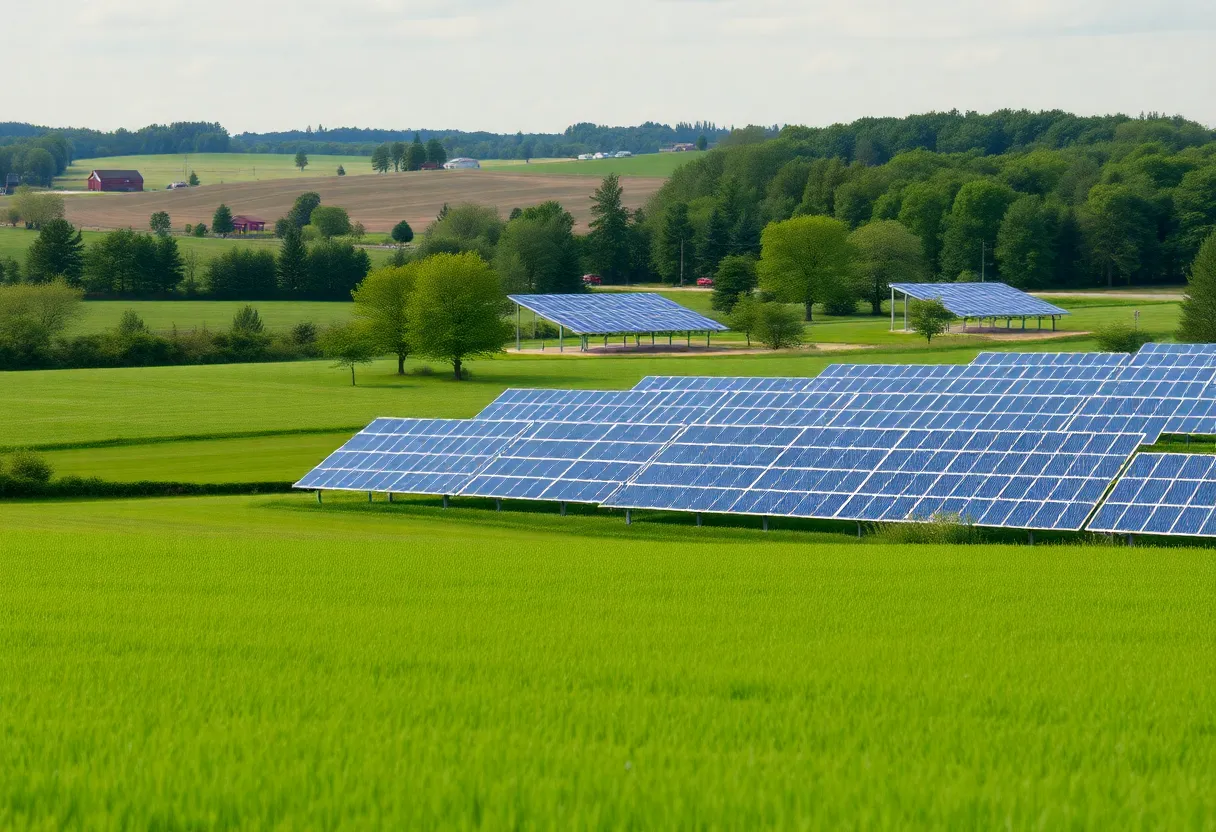News Summary
The Lexington Planning Commission has recommended prohibiting ground-mounted solar farms on farmland following a proposal from Silicon Ranch for a 797-acre solar project. This has sparked a local debate on land use priorities and the need for regulations regarding solar installations in Fayette County. While some council members push for rural solar developments as part of achieving net-zero carbon emissions by 2050, concerns about the impact on agricultural land persist among local preservationists.
Lexington – The Lexington Planning Commission has recommended the prohibition of ground-mounted solar farms on farmland, following a proposal from Silicon Ranch, a company keen on developing a 797-acre solar farm in the protected agricultural area of Haley Road. This recommendation has ignited a local debate regarding land use priorities in Fayette County.
Currently, Lexington lacks explicit local laws that either permit or prohibit solar farms. The absence of such regulations has drawn interest from private companies like Silicon Ranch, which aims to establish solar installations in rural areas. The company submitted a request for zoning regulations to facilitate solar development in Fayette County’s agricultural sectors.
The Planning Commission’s recommendation emphasizes that ground-mounted solar installations—defined as free-standing solar panels anchored to the land—should be prohibited outside of industrial zones. The intent is to protect the county’s agricultural economy and community identity, long safeguarded by existing zoning laws. Local preservationists have expressed concerns that developing solar farms could undermine the agricultural landscape, leading to a potential domino effect that may incentivize further land purchases by developers.
The proposed ordinance aims to regulate solar panel use rigorously, suggesting that ground-mounted solar installations be restricted beyond the urban service boundary, thereby preserving the integrity of rural farmland. Lexington has set an ambitious target to achieve net-zero carbon emissions by 2050, with some city council members advocating for opening up rural areas for solar development as part of this effort. However, Councilmember Dave Sevigny argued that it is unjust to place the burden of carbon emissions reduction solely on urban areas, indicating a need for equitable investments across the entire county.
The Planning Commission has aimed to create a regulatory framework that allows for solar installations without infringing on agricultural zones. At present, local regulations surrounding solar projects are notably lacking. The existing zoning laws only address the height of roof-mounted solar panels, while the Board of Adjustment has permitted solar panels for industrial use but has halted approvals for ground-mounted solar on farmland.
While the Planning Commission has called for further examination before solidifying regulations for rural solar installations, recent attempts by Councilmembers Sevigny and Liz Sheehan to amend the ordinance to allow ground-mounted solar in agricultural zones failed to pass through committee review. These lawmakers are expected to continue their efforts in an upcoming council work session.
The Planning Commission had a six-month timeframe to respond to Silicon Ranch’s request for a zoning ordinance amendment. If adopted, the proposed changes would permit large-scale solar operations exceeding 10 acres under conditional use permits in agricultural zones. Smaller ground-mounted systems would be allowed as accessory uses within these areas, provided they maintain a minimum of 85% vegetative cover beneath the solar panels.
Furthermore, the ordinance would restrict solar farms to only 2% of Fayette County’s rural land, translating to approximately 2,600 acres. Proposed provisions may also permit intermediate-scale solar installations in medium and high-density residential zones, expanding the potential for solar energy development across diverse areas.
Councilmember Hil Boone expressed support for solar energy but underscored the critical importance of preserving prime farmland, linking it directly to the region’s agricultural identity. Silicon Ranch, which operates more than 180 energy projects in 15 states and recently opened a 520-acre solar farm in Garrard County, has faced scrutiny from local agricultural organizations such as the Fayette County Farm Bureau concerning the potential for soil degradation resulting from solar farm infrastructure. Silicon Ranch has asserted that their land management practices will maintain soil health for future agricultural uses after the decommissioning of their projects, which they commit to stabilizing and covering all costs for after a 40-year operational period.
The Planning Commission’s recommendations reflect broader concerns about the impact of large solar installations on fertile agricultural lands, sparking an ongoing discourse about the balancing act of renewable energy development and agricultural preservation in Fayette County.
Deeper Dive: News & Info About This Topic
HERE Resources
Lexington Mayor Raises Concerns Over Solar Farm Project
Additional Resources
- Spectrum News: Solar Farm Project Pushback
- Wikipedia: Solar Energy
- LEX 18: New Solar Farm Approved in Fayette County
- Google Search: Solar Energy Development Kentucky
- Kentucky.com: Op-Ed on Solar Energy
- Encyclopedia Britannica: Renewable Energy
- WKYT: PSC Approves Fayette Co. Solar Farm
- Google News: Fayette County Solar Farm

Author: STAFF HERE LEXINGTON KY STAFF
The LEXINGTON STAFF WRITER represents the experienced team at HERELexingtonKY.com, your go-to source for actionable local news and information in Lexington, Fayette County, and beyond. Specializing in "news you can use," we cover essential topics like product reviews for personal and business needs, local business directories, politics, real estate trends, neighborhood insights, and state news affecting the area—with deep expertise drawn from years of dedicated reporting and strong community input, including local press releases and business updates. We deliver top reporting on high-value events such as Woodland Art Fair, Crave Food and Music Festival, and Railbird Festival. Our coverage extends to key organizations like Commerce Lexington and Blue Grass Community Foundation, plus leading businesses in education, manufacturing, and technology that power the local economy such as University of Kentucky, Toyota Motor Manufacturing, and Lexmark. As part of the broader HERE network, including HEREBowlingGreen.com and HERELouisville.com, we provide comprehensive, credible insights into Kentucky's dynamic landscape.





